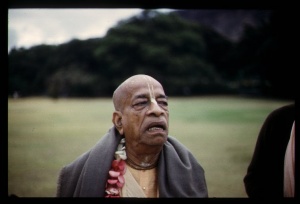SB 6.1.25: Difference between revisions
m (1 revision(s)) |
No edit summary |
||
| Line 1: | Line 1: | ||
{{info | {{info | ||
|speaker= | |speaker=Śukadeva Gosvāmī | ||
|listener=King | |listener=King Parīkṣit | ||
}} | }} | ||
[[Category:Srimad-Bhagavatam - Canto 06 Chapter 01]] | |||
[[Category:Bhagavatam Verses Spoken by Sukadeva Gosvami - Vanisource|060125]] | |||
<div style="float:left">'''[[Srimad-Bhagavatam]] - [[SB 6|Sixth Canto]] - [[SB 6.1: The History of the Life of Ajamila|Chapter 1: The History of the Life of Ajāmila]]'''</div> | |||
<div style="float:right">[[File:Go-previous.png|link=SB 6.1.24]] '''[[SB 6.1.24]] - [[SB 6.1.26]]''' [[File:Go-next.png|link=SB 6.1.26]]</div> | |||
{{RandomImage}} | |||
==== TEXT 25 ==== | ==== TEXT 25 ==== | ||
<div | <div class="verse"> | ||
sa baddha-hṛdayas tasminn | :sa baddha-hṛdayas tasminn | ||
arbhake kala-bhāṣiṇi | :arbhake kala-bhāṣiṇi | ||
nirīkṣamāṇas tal-līlāṁ | :nirīkṣamāṇas tal-līlāṁ | ||
mumude jaraṭho bhṛśam | :mumude jaraṭho bhṛśam | ||
</div> | </div> | ||
| Line 16: | Line 22: | ||
==== SYNONYMS ==== | ==== SYNONYMS ==== | ||
<div | <div class="synonyms"> | ||
''saḥ''—he; ''baddha-hṛdayaḥ''—being very attached; ''tasmin''—to that; ''arbhake''—small child; ''kala-bhāṣiṇi''—who could not talk clearly but talked in broken language; ''nirīkṣamāṇaḥ''—seeing; ''tat''—his; ''līlām''—pastimes (such as walking and talking to his father); ''mumude''—enjoyed; ''jaraṭhaḥ''—the old man; ''bhṛśam''—very much. | |||
</div> | </div> | ||
| Line 23: | Line 29: | ||
==== TRANSLATION ==== | ==== TRANSLATION ==== | ||
<div | <div class="translation"> | ||
Because of the child's broken language and awkward movements, old Ajāmila was very much attached to him. He always took care of the child and enjoyed the child's activities. | Because of the child's broken language and awkward movements, old Ajāmila was very much attached to him. He always took care of the child and enjoyed the child's activities. | ||
</div> | </div> | ||
| Line 30: | Line 36: | ||
==== PURPORT ==== | ==== PURPORT ==== | ||
<div | <div class="purport"> | ||
Here it is clearly mentioned that the child Nārāyaṇa was so young that he could not even speak or walk properly. Since the old man was very attached to the child, he enjoyed the child's activities, and because the child's name was Nārāyaṇa, the old man always chanted the holy name of Nārāyaṇa. Although he was referring to the small child and not to the original Nārāyaṇa, the name of Nārāyaṇa is so powerful that even by chanting his son's name he was becoming purified (harer nāma harer nāma harer nāmaiva kevalam ([[CC Adi 17.21]])). Śrīla Rūpa Gosvāmī has therefore declared that if one's mind is somehow or other attracted by the holy name of Kṛṣṇa (tasmāt kenāpy upāyena manaḥ kṛṣṇe niveśayet ([[SB 7.1.32]])), one is on the path of liberation. It is customary in Hindu society for parents to give their children names like Kṛṣṇadāsa, Govinda dāsa, Nārāyaṇa dāsa and Vṛndāvana dāsa. Thus they chant the names Kṛṣṇa, Govinda, Nārāyaṇa and Vṛndāvana and get the chance to be purified. | Here it is clearly mentioned that the child Nārāyaṇa was so young that he could not even speak or walk properly. Since the old man was very attached to the child, he enjoyed the child's activities, and because the child's name was Nārāyaṇa, the old man always chanted the holy name of Nārāyaṇa. Although he was referring to the small child and not to the original Nārāyaṇa, the name of Nārāyaṇa is so powerful that even by chanting his son's name he was becoming purified (''harer nāma harer nāma harer nāmaiva kevalam'' ([[CC Adi 17.21]])). Śrīla Rūpa Gosvāmī has therefore declared that if one's mind is somehow or other attracted by the holy name of Kṛṣṇa (''tasmāt kenāpy upāyena manaḥ kṛṣṇe niveśayet'' ([[SB 7.1.32]])), one is on the path of liberation. It is customary in Hindu society for parents to give their children names like Kṛṣṇadāsa, Govinda dāsa, Nārāyaṇa dāsa and Vṛndāvana dāsa. Thus they chant the names Kṛṣṇa, Govinda, Nārāyaṇa and Vṛndāvana and get the chance to be purified. | ||
</div> | </div> | ||
__NOTOC__ | |||
<div style="float:right; clear:both;">[[File:Go-previous.png|link=SB 6.1.24]] '''[[SB 6.1.24]] - [[SB 6.1.26]]''' [[File:Go-next.png|link=SB 6.1.26]]</div> | |||
__NOTOC__ | |||
__NOEDITSECTION__ | |||
Revision as of 08:11, 11 May 2021

A.C. Bhaktivedanta Swami Prabhupada
TEXT 25
- sa baddha-hṛdayas tasminn
- arbhake kala-bhāṣiṇi
- nirīkṣamāṇas tal-līlāṁ
- mumude jaraṭho bhṛśam
SYNONYMS
saḥ—he; baddha-hṛdayaḥ—being very attached; tasmin—to that; arbhake—small child; kala-bhāṣiṇi—who could not talk clearly but talked in broken language; nirīkṣamāṇaḥ—seeing; tat—his; līlām—pastimes (such as walking and talking to his father); mumude—enjoyed; jaraṭhaḥ—the old man; bhṛśam—very much.
TRANSLATION
Because of the child's broken language and awkward movements, old Ajāmila was very much attached to him. He always took care of the child and enjoyed the child's activities.
PURPORT
Here it is clearly mentioned that the child Nārāyaṇa was so young that he could not even speak or walk properly. Since the old man was very attached to the child, he enjoyed the child's activities, and because the child's name was Nārāyaṇa, the old man always chanted the holy name of Nārāyaṇa. Although he was referring to the small child and not to the original Nārāyaṇa, the name of Nārāyaṇa is so powerful that even by chanting his son's name he was becoming purified (harer nāma harer nāma harer nāmaiva kevalam (CC Adi 17.21)). Śrīla Rūpa Gosvāmī has therefore declared that if one's mind is somehow or other attracted by the holy name of Kṛṣṇa (tasmāt kenāpy upāyena manaḥ kṛṣṇe niveśayet (SB 7.1.32)), one is on the path of liberation. It is customary in Hindu society for parents to give their children names like Kṛṣṇadāsa, Govinda dāsa, Nārāyaṇa dāsa and Vṛndāvana dāsa. Thus they chant the names Kṛṣṇa, Govinda, Nārāyaṇa and Vṛndāvana and get the chance to be purified.